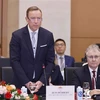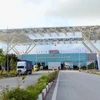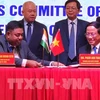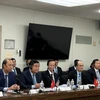The Government has reiterated its policy of attaching importance to private investment in infrastructure development.
Deputy Minister of Planning and Investment (MPI) Dang Huy Dong told a meeting on public-private partnerships (PPP) in Hanoi on May 4 that the Government expected the policy would attract not only investment, but also advanced technology and managerial experience for the development of infrastructure and public services.
MPI reported that Vietnam needed some 160 billion USD up to 2020, to invest in roads, bridges, sewerage and waste treatment facilities.
State budgets, Government bonds and official development assistance (ODA) will meet just half of the demand, leaving the rest to enterprises both at home and abroad.
The PPP policy making has been based on international rules which clarify requirements in economic efficiency, transparency and equal competition between domestic and foreign investors. The PPP legal framework calls on public and private investors to share responsibility, conduct an appropriate risk management while working for rational interests between the State, private sector and service users.
The PPP scheme is expected to create a truly commercial PPP market in Vietnam, prioritising projects on socio-economic development, ranging from bridges to subways, sea, river and airports, power and water supply and sewerage.
The Director of the Private Sector Operations Department under the Asian Development Bank (ADB), Philip C. Erquiga, backed the Vietnamese Government’s policy, describing the PPP model as an important tool to encourage the private sector to join in infrastructure investment in the Asian-Pacific region and Vietnam in particular.
He called on Vietnam to have a clear vision on the relevant policy and be better prepared for PPP projects by conducting feasibility studies and considering social aspects.
State financial assistance and subsidies as well as Government guarantees would play an important role in convincing the private sector to invest in PPP projects, said the senior expert from the ADB, which is holding its annual meeting in Vietnam.
He emphasised ADB’s willingness to help Vietnam in policymaking and fundraising in regard to PPP projects.
In fact, ADB signed a memorandum of understanding on multiple loans with the MPI in support of Vietnam’s pilot PPP projects.
The Director of the International Financial Corporation (IFC)-Cambodia, Thailand and Vietnam Region, Simon Andrews, called on Vietnam to focus on coordination of action among relevant ministries and agencies in handling PPP projects, so as to place projects in a suitable order of priorities.
The PPP meeting took place on the sidelines of the ADB annual meeting, which entered the second day in Hanoi on May 4./.
Deputy Minister of Planning and Investment (MPI) Dang Huy Dong told a meeting on public-private partnerships (PPP) in Hanoi on May 4 that the Government expected the policy would attract not only investment, but also advanced technology and managerial experience for the development of infrastructure and public services.
MPI reported that Vietnam needed some 160 billion USD up to 2020, to invest in roads, bridges, sewerage and waste treatment facilities.
State budgets, Government bonds and official development assistance (ODA) will meet just half of the demand, leaving the rest to enterprises both at home and abroad.
The PPP policy making has been based on international rules which clarify requirements in economic efficiency, transparency and equal competition between domestic and foreign investors. The PPP legal framework calls on public and private investors to share responsibility, conduct an appropriate risk management while working for rational interests between the State, private sector and service users.
The PPP scheme is expected to create a truly commercial PPP market in Vietnam, prioritising projects on socio-economic development, ranging from bridges to subways, sea, river and airports, power and water supply and sewerage.
The Director of the Private Sector Operations Department under the Asian Development Bank (ADB), Philip C. Erquiga, backed the Vietnamese Government’s policy, describing the PPP model as an important tool to encourage the private sector to join in infrastructure investment in the Asian-Pacific region and Vietnam in particular.
He called on Vietnam to have a clear vision on the relevant policy and be better prepared for PPP projects by conducting feasibility studies and considering social aspects.
State financial assistance and subsidies as well as Government guarantees would play an important role in convincing the private sector to invest in PPP projects, said the senior expert from the ADB, which is holding its annual meeting in Vietnam.
He emphasised ADB’s willingness to help Vietnam in policymaking and fundraising in regard to PPP projects.
In fact, ADB signed a memorandum of understanding on multiple loans with the MPI in support of Vietnam’s pilot PPP projects.
The Director of the International Financial Corporation (IFC)-Cambodia, Thailand and Vietnam Region, Simon Andrews, called on Vietnam to focus on coordination of action among relevant ministries and agencies in handling PPP projects, so as to place projects in a suitable order of priorities.
The PPP meeting took place on the sidelines of the ADB annual meeting, which entered the second day in Hanoi on May 4./.



















